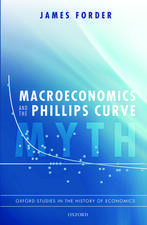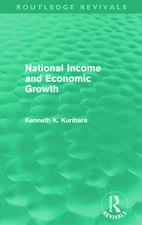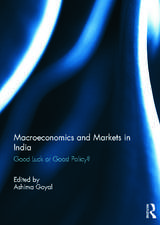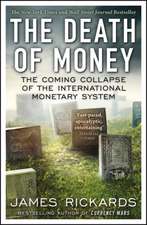Macroeconomic Forecasting: A Sociological Appraisal: Routledge Studies in the Modern World Economy
Autor Robert Evansen Limba Engleză Paperback – 26 aug 2015
| Toate formatele și edițiile | Preț | Express |
|---|---|---|
| Paperback (1) | 445.38 lei 6-8 săpt. | |
| Taylor & Francis – 26 aug 2015 | 445.38 lei 6-8 săpt. | |
| Hardback (1) | 1001.84 lei 6-8 săpt. | |
| Taylor & Francis – 24 iun 1999 | 1001.84 lei 6-8 săpt. |
Din seria Routledge Studies in the Modern World Economy
-
 Preț: 310.84 lei
Preț: 310.84 lei - 8%
 Preț: 389.45 lei
Preț: 389.45 lei -
 Preț: 384.86 lei
Preț: 384.86 lei -
 Preț: 324.35 lei
Preț: 324.35 lei -
 Preț: 310.33 lei
Preț: 310.33 lei -
 Preț: 385.79 lei
Preț: 385.79 lei -
 Preț: 326.15 lei
Preț: 326.15 lei -
 Preț: 298.64 lei
Preț: 298.64 lei - 18%
 Preț: 1112.34 lei
Preț: 1112.34 lei - 26%
 Preț: 992.21 lei
Preț: 992.21 lei - 15%
 Preț: 714.29 lei
Preț: 714.29 lei - 18%
 Preț: 1054.27 lei
Preț: 1054.27 lei - 26%
 Preț: 821.46 lei
Preț: 821.46 lei - 18%
 Preț: 1167.78 lei
Preț: 1167.78 lei - 15%
 Preț: 699.01 lei
Preț: 699.01 lei - 18%
 Preț: 946.06 lei
Preț: 946.06 lei - 18%
 Preț: 1230.51 lei
Preț: 1230.51 lei -
 Preț: 398.18 lei
Preț: 398.18 lei - 18%
 Preț: 1167.61 lei
Preț: 1167.61 lei - 26%
 Preț: 1014.31 lei
Preț: 1014.31 lei - 25%
 Preț: 823.99 lei
Preț: 823.99 lei - 26%
 Preț: 822.54 lei
Preț: 822.54 lei - 18%
 Preț: 1166.68 lei
Preț: 1166.68 lei - 26%
 Preț: 849.65 lei
Preț: 849.65 lei - 18%
 Preț: 1278.70 lei
Preț: 1278.70 lei - 18%
 Preț: 1059.84 lei
Preț: 1059.84 lei - 15%
 Preț: 699.01 lei
Preț: 699.01 lei - 25%
 Preț: 1022.76 lei
Preț: 1022.76 lei - 24%
 Preț: 564.95 lei
Preț: 564.95 lei - 18%
 Preț: 720.49 lei
Preț: 720.49 lei - 18%
 Preț: 1061.93 lei
Preț: 1061.93 lei - 15%
 Preț: 643.71 lei
Preț: 643.71 lei - 18%
 Preț: 711.10 lei
Preț: 711.10 lei - 18%
 Preț: 905.11 lei
Preț: 905.11 lei - 18%
 Preț: 1109.21 lei
Preț: 1109.21 lei - 18%
 Preț: 1171.89 lei
Preț: 1171.89 lei - 18%
 Preț: 1064.67 lei
Preț: 1064.67 lei - 18%
 Preț: 1167.43 lei
Preț: 1167.43 lei - 18%
 Preț: 1057.05 lei
Preț: 1057.05 lei -
 Preț: 423.30 lei
Preț: 423.30 lei - 18%
 Preț: 1063.28 lei
Preț: 1063.28 lei - 18%
 Preț: 1167.36 lei
Preț: 1167.36 lei - 18%
 Preț: 1123.68 lei
Preț: 1123.68 lei - 15%
 Preț: 694.09 lei
Preț: 694.09 lei -
 Preț: 398.44 lei
Preț: 398.44 lei - 18%
 Preț: 1219.38 lei
Preț: 1219.38 lei - 26%
 Preț: 873.52 lei
Preț: 873.52 lei - 18%
 Preț: 1062.93 lei
Preț: 1062.93 lei - 29%
 Preț: 1030.16 lei
Preț: 1030.16 lei - 26%
 Preț: 765.84 lei
Preț: 765.84 lei
Preț: 445.38 lei
Nou
Puncte Express: 668
Preț estimativ în valută:
85.22€ • 89.22$ • 70.52£
85.22€ • 89.22$ • 70.52£
Carte tipărită la comandă
Livrare economică 05-19 aprilie
Preluare comenzi: 021 569.72.76
Specificații
ISBN-13: 9781138866256
ISBN-10: 1138866253
Pagini: 256
Dimensiuni: 156 x 234 x 13 mm
Greutate: 0.36 kg
Ediția:1
Editura: Taylor & Francis
Colecția Routledge
Seria Routledge Studies in the Modern World Economy
Locul publicării:Oxford, United Kingdom
ISBN-10: 1138866253
Pagini: 256
Dimensiuni: 156 x 234 x 13 mm
Greutate: 0.36 kg
Ediția:1
Editura: Taylor & Francis
Colecția Routledge
Seria Routledge Studies in the Modern World Economy
Locul publicării:Oxford, United Kingdom
Public țintă
PostgraduateRecenzii
'...the book offers informative insight to any student of the making of macroeconomic policy in the UK...' - Anca Porojan - International Journal of Forecasting 16 (2000) 423-340
Cuprins
1. Who Knows What Tomorrow Brings? Brief Introductions to Economic Forecasting and the Sociology of Scientific Knowledge 2. Cherished Beliefs and Statistics: How Economic Models are Estimated 3. Extrapolations and Expertise: How Economic Forecasts Are Made 4. Soothsaying or Science? Trying to Falsify an Economic Model 5. Different Models: Economic Forecasts in February 1993 6. Different Futures: Controversies and Disputes in July 1993 7. Difficult Choices: Policy Recommendations in October 1993 8. From TINA to TRACY: Economic Models, Economic Policy and Science Studies
Descriere
Drawing on interviews with the UK government's Panel of Independent Forecasters, the author shows how economic models, forecasts and policy analysis depend crucially upon the judgements of economists.

























